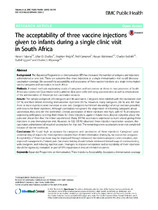The acceptability of three vaccine injections given to infants during a single clinic visit in South Africa
Date
2016Author
Tabana, Hanani
Dudley, Lilian D.
Knight, Stephen
Cameron, Neil
Mahomed, Hassan
Goliath, Charlyn
Eggers, Rudolf
Wiysonge, Charles S.
Metadata
Show full item recordAbstract
BACKGROUND: The Expanded Programme on Immunisation (EPI) has increased the number of antigens and injections
administered at one visit. There are concerns that more injections at a single immunisation visit could decrease
vaccination coverage. We assessed the acceptability and acceptance of three vaccine injections at a single immunisation
visit by caregivers and vaccinators in South Africa.
METHODS: A mixed methods exploratory study of caregivers and vaccinators at clinics in two provinces of South
Africa was conducted. Quantitative and qualitative data were collected using questionnaires as well as observations
of the administration of three-injection vaccination sessions.
RESULTS: The sample comprised 229 caregivers and 98 vaccinators. Caregivers were satisfied with the vaccinators’ care
(97 %) and their infants receiving immunisation injections (93 %). However, many caregivers, (86 %) also felt that
three or more injections were excessive at one visit. Caregivers had limited knowledge of actual vaccines provided,
and reasons for three injections. Although vaccinators recognised the importance of informing caregivers about
vaccination, they only did this sometimes. Overall, acceptance of three injections was high, with 97 % of caregivers
expressing willingness to bring their infant for three injections again in future visits despite concerns about the
pain and discomfort that the infant experienced. Many (55 %) vaccinators expressed concern about giving three
injections in one immunisation visit. However, in 122 (95 %) observed three-injection vaccination sessions, the
vaccinators administered all required vaccinations for that visit. The remaining seven vaccinations were not completed
because of vaccine stock-outs.
CONCLUSIONS: We found high acceptance by caregivers and vaccinators of three injections. Caregivers’ poor
understanding of reasons for three injections resulted from limited information sharing by vaccinators for caregivers.
Acceptability of three injections may be improved through enhanced vaccinator-caregiver communication, and
improved management of infants’ pain. Vaccinator training should include evidence-informed ways of communicating
with caregivers and reducing injection pain. Strategies to improve acceptance and acceptability of three injections
should be rigorously evaluated as part of EPI’s expansion in resource-limited countries.

